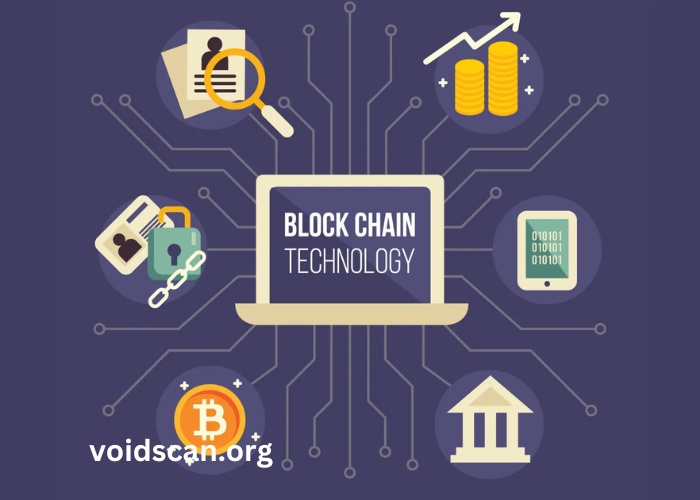
In recent years, blockchain technology has emerged as one of the most disruptive innovations across various industries, especially in finance and data security. Originally developed as the underlying technology for cryptocurrencies like Bitcoin, blockchain has proven to be far more versatile and impactful than initially anticipated. Today, businesses and governments are exploring how blockchain can reshape traditional processes and systems, providing unprecedented levels of security, transparency, and efficiency.
Blockchain operates as a decentralized digital ledger that records transactions across multiple computers in a way that ensures the data is immutable and transparent. By eliminating the need for intermediaries, blockchain technology has the potential to lower costs, streamline operations, and enhance trust in digital transactions. This article explores how blockchain is revolutionizing finance and data security, along with the challenges, opportunities, and future trends associated with its implementation.
1. Understanding Blockchain Technology
At its core, blockchain technology is a distributed database that records transactions in a secure, transparent, and tamper-resistant manner. Each block in a blockchain contains a set of transactions, and these blocks are linked to one another, forming a chain. Once a block is added to the chain, it cannot be altered or deleted, making blockchain highly secure and resistant to fraud.
Blockchain is decentralized, meaning that no single entity controls the entire network. Instead, it relies on a consensus mechanism, where multiple participants (nodes) in the network validate and verify transactions. This decentralization ensures that blockchain technology operates independently of any central authority, such as a bank or government, offering greater security and transparency.
2. Blockchain in Finance: Transforming Traditional Banking
Blockchain technology is particularly transformative in the financial sector, where it has the potential to disrupt traditional banking systems. By removing intermediaries such as banks and payment processors, blockchain enables faster, cheaper, and more secure transactions. Traditional banking systems are often slow and expensive, particularly when transferring money across borders. Blockchain can significantly reduce transaction costs and processing times by facilitating peer-to-peer transactions.
Additionally, blockchain enhances the security of financial transactions. Since each transaction is recorded on an immutable ledger, the risk of fraud is greatly reduced. Blockchain’s transparency also ensures that all parties involved in a transaction can verify its authenticity in real time.
Moreover, blockchain offers the possibility of fractional ownership of assets. Through tokenization, assets such as real estate, art, and stocks can be divided into smaller, tradable units. This increases accessibility and liquidity, making it easier for individuals to invest in previously inaccessible markets.
3. Cryptocurrencies: Blockchain’s Role in the Evolution of Digital Money
The most well-known application of blockchain technology is cryptocurrencies, with Bitcoin being the most prominent example. Cryptocurrencies are digital or virtual currencies that use cryptography for security, making them resistant to counterfeiting. Blockchain serves as the underlying technology that enables secure and transparent cryptocurrency transactions.
Cryptocurrencies offer several advantages over traditional forms of money. They provide a decentralized and global means of payment, allowing users to send and receive money without relying on banks or other intermediaries. This makes cryptocurrencies especially useful in regions with limited access to banking infrastructure.
However, the rise of cryptocurrencies has also raised concerns regarding regulation, volatility, and security. Governments and financial institutions are working on creating frameworks to address these challenges while fostering innovation in the cryptocurrency space.
4. Enhancing Data Security with Blockchain
One of the most significant benefits of blockchain technology is its ability to enhance data security. Traditional centralized systems are vulnerable to hacking, as a single breach can compromise the entire system. In contrast, blockchain’s decentralized nature ensures that no single point of failure exists, making it much more secure.
Blockchain utilizes cryptographic techniques to secure transactions and data. Each block in the chain is encrypted, and the data it contains is verified by multiple participants in the network. This makes it extremely difficult for malicious actors to alter or manipulate the data without being detected.
Furthermore, blockchain’s transparency provides an additional layer of security. Since all transactions are visible to all participants in the network, any suspicious activity can be easily identified and flagged. This makes blockchain an ideal solution for applications that require high levels of data integrity, such as financial transactions, medical records, and supply chain management.
5. Smart Contracts: Automating and Securing Agreements
Smart contracts are self-executing contracts with the terms of the agreement directly written into code. These contracts are stored and executed on a blockchain, allowing parties to enter into agreements without the need for intermediaries. Smart contracts automatically execute the agreed-upon terms when specific conditions are met, reducing the potential for disputes and fraud.
In the financial sector, smart contracts can be used to automate processes such as loan agreements, insurance claims, and investment transactions. For example, in a loan agreement, a smart contract could automatically release funds when certain criteria are met, such as the borrower providing collateral or meeting repayment deadlines.
Smart contracts have the potential to streamline operations across industries, saving time, reducing costs, and increasing trust between parties. As blockchain adoption grows, smart contracts are expected to become increasingly common in sectors such as real estate, supply chain management, and legal services.
6. Blockchain’s Role in Supply Chain Management
Supply chain management is another area where blockchain technology is making a significant impact. By providing real-time visibility into the movement of goods, blockchain enhances transparency and accountability across the supply chain. Each transaction, from the manufacturer to the distributor to the retailer, is recorded on a blockchain, making it easy to trace the origin and journey of products.
This transparency helps to ensure the authenticity of products, particularly in industries such as luxury goods, pharmaceuticals, and food. For example, blockchain can be used to track the sourcing of ingredients in the food industry, providing consumers with information about the product’s origin and ensuring that it meets quality standards.
Blockchain also helps streamline the supply chain by reducing paperwork and manual processes. Smart contracts can automate many supply chain tasks, such as invoicing and payment, reducing the risk of errors and delays. In the future, blockchain has the potential to make supply chains more efficient, transparent, and secure.
7. Blockchain and the Future of Identity Management
Blockchain technology is poised to revolutionize identity management by offering a decentralized, secure, and transparent method for verifying identities. Traditional identity management systems are vulnerable to fraud and data breaches, as personal information is often stored in centralized databases that can be targeted by hackers.
With blockchain, individuals can control their own identity and securely share their personal information only when necessary. Blockchain-based digital IDs can be used for various purposes, such as accessing online services, verifying age, and completing financial transactions. Since blockchain records are immutable and secure, they provide a high level of assurance that the information is accurate and trustworthy.
The future of identity management is expected to be highly decentralized, with individuals using blockchain to store and share their identities in a secure and transparent way. This could significantly reduce the risk of identity theft and improve the security of online transactions.
8. Blockchain in Healthcare: Improving Patient Data Management
Blockchain has the potential to transform the healthcare industry by improving the management of patient data. Currently, patient information is often fragmented across different systems and organizations, making it difficult to share and access the data in a secure and efficient manner.
With blockchain, healthcare providers can create a single, immutable record of a patient’s medical history that is accessible to authorized parties only. This ensures that patient data is secure, transparent, and easily accessible, reducing the likelihood of errors and improving patient outcomes. Additionally, blockchain can streamline processes such as billing, insurance claims, and prescription management.
As the healthcare industry embraces digital transformation, blockchain is expected to play a crucial role in improving data management, enhancing privacy, and reducing administrative costs.
9. Blockchain’s Potential in Voting Systems
One of the most promising applications of blockchain technology is in voting systems. Traditional voting methods are vulnerable to fraud, manipulation, and errors, making it difficult to ensure the integrity of elections. Blockchain technology offers a transparent, secure, and tamper-proof solution for online voting.
By recording each vote on a blockchain, election authorities can ensure that votes are securely cast, recorded, and counted without the possibility of tampering. Voters can verify their vote in real time, providing greater transparency and accountability. Blockchain-based voting systems could potentially increase voter participation by enabling secure and accessible online voting.
While the widespread adoption of blockchain voting faces regulatory and technical challenges, its potential to improve election security and transparency is undeniable.
10. The Role of Blockchain in Cross-Border Payments
Cross-border payments have traditionally been slow, expensive, and prone to errors, as multiple intermediaries are involved in the process. Blockchain technology offers a solution to these challenges by enabling direct peer-to-peer transactions across borders.
Blockchain can significantly reduce the time and cost associated with cross-border payments by eliminating intermediaries such as banks and payment processors. Transactions can be completed in real time, with lower fees and greater transparency. This has the potential to revolutionize the global remittance market, where individuals send money to family members across borders.
The adoption of blockchain for cross-border payments is expected to grow rapidly, as businesses and individuals seek faster, more cost-effective ways to transfer money internationally.
11. Blockchain in Real Estate: Streamlining Property Transactions
The real estate industry is often plagued by inefficiencies, including lengthy paperwork, high transaction costs, and a lack of transparency. Blockchain has the potential to streamline property transactions by providing a secure, transparent, and immutable record of property ownership.
Using blockchain, buyers, sellers, and agents can securely transfer ownership of property without the need for intermediaries, such as title companies and notaries. Smart contracts can automate the process of transferring ownership, ensuring that all terms are met before the transaction is finalized. Additionally, blockchain can provide a transparent record of property history, helping to prevent fraud and disputes.
In the future, blockchain could revolutionize the real estate industry by making property transactions faster, cheaper, and more secure.
12. Blockchain and Sustainability: Promoting Transparency in Supply Chains
Blockchain technology can also play a significant role in promoting sustainability by enhancing transparency in supply chains. Consumers and businesses are increasingly concerned with the environmental and social impact of the products they purchase. Blockchain can provide a transparent, verifiable record of the entire supply chain, allowing consumers to trace the origin and journey of the products they buy.
For example, blockchain can be used to verify that products are ethically sourced, environmentally friendly, and produced under fair labor conditions. This increased transparency can encourage businesses to adopt more sustainable practices and give consumers the confidence that their purchases align with their values.
13. Regulatory Challenges and Blockchain Adoption
While blockchain technology holds tremendous potential, its widespread adoption faces several regulatory challenges. Governments and regulatory bodies around the world are still grappling with how to regulate blockchain and cryptocurrency activities. Issues such as data privacy, taxation, and anti-money laundering (AML) regulations need to be addressed to ensure that blockchain technology is used responsibly and ethically.
As blockchain adoption grows, regulatory frameworks will likely evolve to provide greater clarity and consistency. Businesses and organizations will need to navigate these regulations carefully to ensure compliance while reaping the benefits of blockchain technology.
14. Blockchain and the Future of Data Privacy
Blockchain technology is expected to play a significant role in enhancing data privacy in the coming years. With the increasing amount of personal data being collected by businesses and governments, ensuring the security and privacy of this information is becoming more critical than ever.
Blockchain can provide individuals with greater control over their personal data, allowing them to choose who can access it and for what purposes. This decentralized approach to data storage and sharing could reduce the risk of data breaches and unauthorized access.
As data privacy concerns continue to grow, blockchain technology may offer a promising solution for protecting personal information in the digital age.
15. Conclusion: Blockchain’s Transformative Impact
Blockchain technology is revolutionizing finance, data security, and countless other industries by providing a secure, transparent, and efficient way to store and share information. From cryptocurrency to healthcare, supply chain management to real estate, blockchain is transforming the way businesses and individuals interact with data.
While challenges remain in terms of regulatory compliance and widespread adoption, the future of blockchain is incredibly promising. As more industries embrace blockchain technology, its impact on finance, data security, and global commerce will continue to grow. Blockchain has the potential to unlock new opportunities, drive innovation, and reshape industries for years to come.





